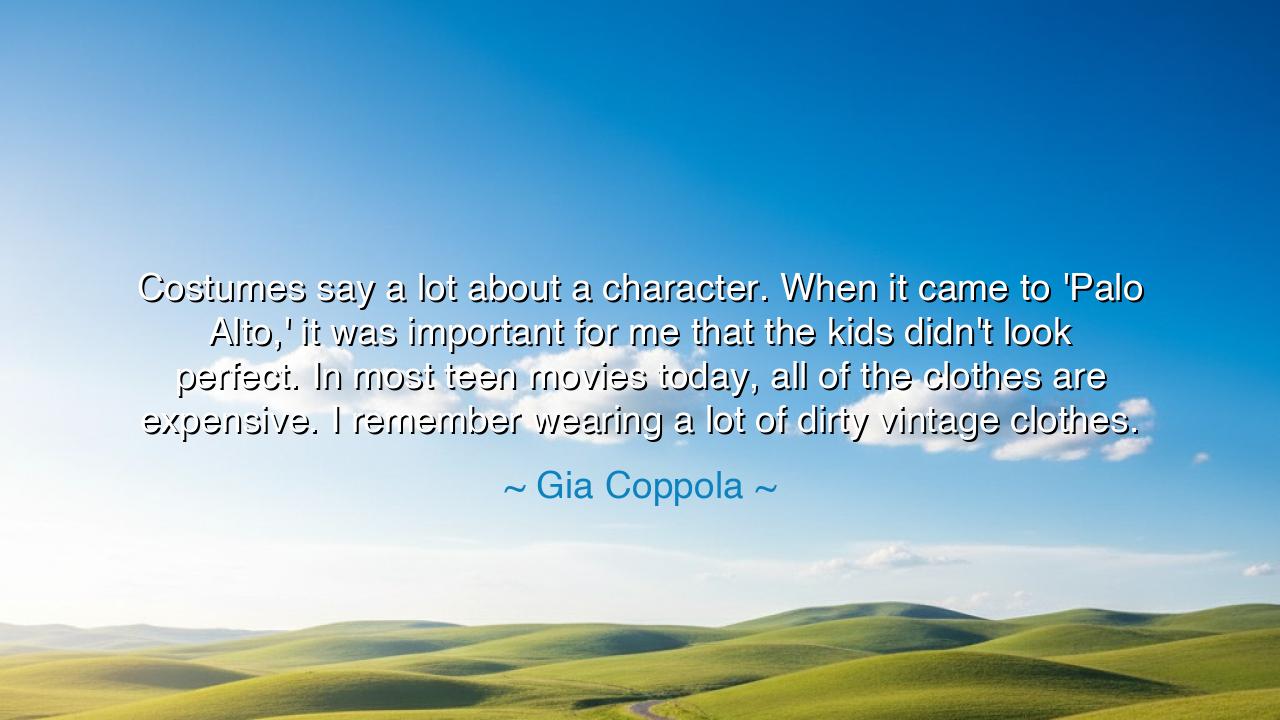
Costumes say a lot about a character. When it came to 'Palo
Costumes say a lot about a character. When it came to 'Palo Alto,' it was important for me that the kids didn't look perfect. In most teen movies today, all of the clothes are expensive. I remember wearing a lot of dirty vintage clothes.






Gia Coppola, inheritor of a great cinematic lineage yet speaking with her own clear voice, declared: “Costumes say a lot about a character. When it came to Palo Alto, it was important for me that the kids didn't look perfect. In most teen movies today, all of the clothes are expensive. I remember wearing a lot of dirty vintage clothes.” Her words reach beyond fashion into the heart of authenticity. She speaks not merely of garments but of truth—the truth that the way we present ourselves to the world reflects our struggles, our imperfections, and our realities.
The costume, whether on stage, in film, or in life, is never neutral. It is a language of cloth and thread, a silent script that shapes how others see us and how we see ourselves. When Coppola chose to dress her characters in imperfect, vintage, and unpolished attire, she was making a declaration: that youth is not flawless, and to pretend otherwise is to deny its honesty. In a world that often polishes away the dirt and wrinkles of reality, her choice was a stand for genuineness over glamour.
The ancients knew this truth well. In the theaters of Athens, the mask and robe were not merely decorations—they were the embodiment of the character’s essence. To wear the armor of Agamemnon or the rags of Oedipus was to signal fate, suffering, and truth. Likewise, in Rome, the toga marked rank, the laurel wreath signaled victory, and the humble tunic spoke of the common man. Clothing has always been a form of narrative, and Coppola reminds us that it must serve the story, not the vanity of the eye.
Consider also the lesson of Mahatma Gandhi, who cast aside Western suits and adopted the simple homespun cloth of his people. This act was not about fashion but about identity and solidarity. His clothing told a story of resistance, humility, and unity with the poor. In the same spirit, Coppola’s insistence on dirty vintage clothes is a rebellion against the glossy unreality of modern cinema—it is a choice to let clothes speak truthfully rather than flatter falsely.
Her words also carry memory: “I remember wearing a lot of dirty vintage clothes.” In this we glimpse not only her artistic philosophy but her own lived youth, textured with imperfection and authenticity. She draws from her own past, teaching us that art must emerge from experience, not imitation. By clothing her characters in what she herself once wore, she weaves her life into the film, giving it the stamp of lived truth.
From this we learn that the stories we tell—whether in art, in speech, or in how we clothe ourselves—must be grounded in honesty. To chase perfection is to create distance; to embrace imperfection is to foster connection. The polished surfaces of cinema may dazzle, but it is the worn and real that awakens recognition in the audience. This is true also of life: people trust the one who dares to show their wrinkles, their patched clothes, their lived scars, more than the one who hides behind a costume of false perfection.
Therefore, the teaching is clear: when you create, when you live, when you dress—seek to reflect reality, not illusion. Do not fear the dirty vintage clothes of your past, for they carry the weight of truth. Let your costume, whether literal or symbolic, speak honestly of who you are and where you have been. In this way, you honor both yourself and those who witness your story.
So, children of tomorrow, remember Coppola’s wisdom: the costume is a voice, and it must speak of truth, not pretense. Whether in film, in leadership, or in daily life, clothe yourself in honesty, in humility, and in authenticity. For the world does not need more perfection—it needs the raw, unpolished truth of who you are. And that truth, like a well-worn garment, will endure longer than any fleeting fashion.






AAdministratorAdministrator
Welcome, honored guests. Please leave a comment, we will respond soon